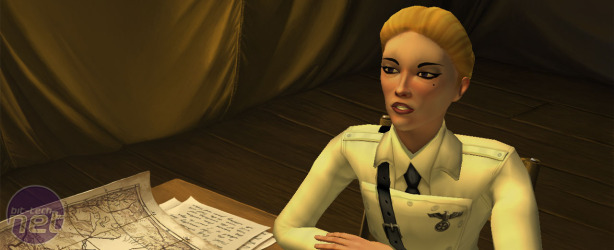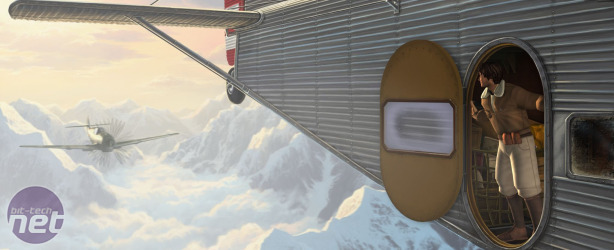
Lost Horizon Hands-on Preview
Publisher: Deep Silver
Developer: Animation Arts
Platform: PC exclusive
Release Date: 27 August 2010
Lost Horizon's story is one of ancient Tibetan artefacts, the mythical kingdom of Shambhala, strange symbols, and of course, Nazis. No prizes for originality then, but the familiarity of the Indiana Jones style plot is oddly comforting, and Lost Horizon has enough unique plot elements to prevent it from becoming stale too quickly.
Set in 1938, Lost Horizon sees you taking on the role of Fenton Paddock, a (very) British soldier. Armed with only his stiff upper lip, Fenton finds himself attempting to outrun a gang of triads in Hong Kong, before having to travel to Tibet to rescue a missing friend. Forced to enlist the help of his ex-girlfriend, Kim, Fenton soon discovers a Nazi military operation in full swing. Naturally, it isn’t long before his rescue mission soon escalates into something of the usual global significance.
The story starts slowly, with lengthy sections of dialogue interspersed with small sections that introduce you to the core gameplay elements. While the plot does become more compelling over time, it rarely has the dramatic immediacy of its cinema counterpart. In fact, it’s occasionally quite tediously delivered – though it may just be because FPS games have, over the years, taught us that we aren’t having fun unless we’re shooting things.
Gameplay takes the form of a point and click adventure, a genre which has seen a number of remakes and reboots recently. There are a set number of observable objects in each environment, some of which can be interacted with and combined for puzzle solving, while others are red herrings.
The ability to interact with an object is signalled by a hand icon when you roll over it, but the game decides what action you take automatically. The upside of this is you’re never stuck trying to find the right verb or command, but things can feel a bit automatic sometimes. Either way, it's a tried and tested formula and one which Animation Arts appear to have utilised well. The difficulty of the puzzles scales well too, starting from the basic and progressing smoothly to harder ones that involve more locations and items at a time.
While the puzzles are generally fair and sensible, there are inevitably a couple of occasions when you reach a dead end. We had to resort to the old try-everything-with-everything approach a few times in fact, especially when the usual adventure game logic started to work against us. Who knew that glue, a broken record and a touch of gunpowder could be so useful for distracting Nazis?
Still, despite a few exceptions, Lost Horizon generally maintains a decent balance between complexity and fairness. Also, for those times when you're struggling, Animation Arts provide an examine button, which reveals everything currently on screen that can be observed and/or interacted with. Very useful for avoiding the old hunt-the-hotspot minigame! There’s also a summary of your current objectives, as well as the option to alter the difficulty of the minigame sections.
The minigames that punctuate the usual point and clicking provide a welcome change of pace too and add variety to the game whilst remaining relevant. In fact, it would be nice to see more than the few on offer as, unlike in most games, the minigames in Lost Horizon make perfect sense for the story and genre.
Animation Arts has made it impossible to fail the adventure at any point in the game - you cannot die or lose, even in fast paced scenes such as a truck chase. Even if circumstances suggest that you are under some time constraints, you never are. While this alleviates frustration from repeated failure, it removes the pressure, and thus the rush, of having to do something quickly. How this feature sits with you is ultimately a matter of personal taste, as while some gamers prefer the purely cerebral challenge of adventure games like this, others like to have the Sword of Damocles hanging over them. If you prefer the old Sierra-style approach, where you can die with a simple misstep, Lost Horizon isn’t the game for you.
Publisher: Deep Silver
Developer: Animation Arts
Platform: PC exclusive
Release Date: 27 August 2010
Lost Horizon's story is one of ancient Tibetan artefacts, the mythical kingdom of Shambhala, strange symbols, and of course, Nazis. No prizes for originality then, but the familiarity of the Indiana Jones style plot is oddly comforting, and Lost Horizon has enough unique plot elements to prevent it from becoming stale too quickly.
Set in 1938, Lost Horizon sees you taking on the role of Fenton Paddock, a (very) British soldier. Armed with only his stiff upper lip, Fenton finds himself attempting to outrun a gang of triads in Hong Kong, before having to travel to Tibet to rescue a missing friend. Forced to enlist the help of his ex-girlfriend, Kim, Fenton soon discovers a Nazi military operation in full swing. Naturally, it isn’t long before his rescue mission soon escalates into something of the usual global significance.
The story starts slowly, with lengthy sections of dialogue interspersed with small sections that introduce you to the core gameplay elements. While the plot does become more compelling over time, it rarely has the dramatic immediacy of its cinema counterpart. In fact, it’s occasionally quite tediously delivered – though it may just be because FPS games have, over the years, taught us that we aren’t having fun unless we’re shooting things.
Gameplay takes the form of a point and click adventure, a genre which has seen a number of remakes and reboots recently. There are a set number of observable objects in each environment, some of which can be interacted with and combined for puzzle solving, while others are red herrings.
The ability to interact with an object is signalled by a hand icon when you roll over it, but the game decides what action you take automatically. The upside of this is you’re never stuck trying to find the right verb or command, but things can feel a bit automatic sometimes. Either way, it's a tried and tested formula and one which Animation Arts appear to have utilised well. The difficulty of the puzzles scales well too, starting from the basic and progressing smoothly to harder ones that involve more locations and items at a time.
While the puzzles are generally fair and sensible, there are inevitably a couple of occasions when you reach a dead end. We had to resort to the old try-everything-with-everything approach a few times in fact, especially when the usual adventure game logic started to work against us. Who knew that glue, a broken record and a touch of gunpowder could be so useful for distracting Nazis?
Still, despite a few exceptions, Lost Horizon generally maintains a decent balance between complexity and fairness. Also, for those times when you're struggling, Animation Arts provide an examine button, which reveals everything currently on screen that can be observed and/or interacted with. Very useful for avoiding the old hunt-the-hotspot minigame! There’s also a summary of your current objectives, as well as the option to alter the difficulty of the minigame sections.
The minigames that punctuate the usual point and clicking provide a welcome change of pace too and add variety to the game whilst remaining relevant. In fact, it would be nice to see more than the few on offer as, unlike in most games, the minigames in Lost Horizon make perfect sense for the story and genre.
Animation Arts has made it impossible to fail the adventure at any point in the game - you cannot die or lose, even in fast paced scenes such as a truck chase. Even if circumstances suggest that you are under some time constraints, you never are. While this alleviates frustration from repeated failure, it removes the pressure, and thus the rush, of having to do something quickly. How this feature sits with you is ultimately a matter of personal taste, as while some gamers prefer the purely cerebral challenge of adventure games like this, others like to have the Sword of Damocles hanging over them. If you prefer the old Sierra-style approach, where you can die with a simple misstep, Lost Horizon isn’t the game for you.

MSI MPG Velox 100R Chassis Review
October 14 2021 | 15:04











Want to comment? Please log in.